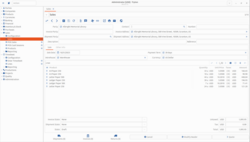
PostgreSQL, also known as Postgres, is a free and open-source relational database management system (RDBMS) emphasizing extensibility and SQL compliance. PostgreSQL features transactions with atomicity, consistency, isolation, durability (ACID) properties, automatically updatable views, materialized views, triggers, foreign keys, and stored procedures. It is supported on all major operating systems, including Linux, FreeBSD, OpenBSD, macOS, and Windows, and handles a range of workloads from single machines to data warehouses or web services with many concurrent users.
Compiere is an open-source ERP and CRM business solution for Small and Medium-sized Enterprises (SME) in distribution, retail, service, and manufacturing. Compiere is distributed by Consona Corporation and through a Partner Network, who are a collection of trained and authorized business partners.

PyQt is a Python binding of the cross-platform GUI toolkit Qt, implemented as a Python plug-in. PyQt is free software developed by the British firm Riverbank Computing. It is available under similar terms to Qt versions older than 4.5; this means a variety of licenses including GNU General Public License (GPL) and commercial license, but not the GNU Lesser General Public License (LGPL). PyQt supports Microsoft Windows as well as various kinds of UNIX, including Linux and MacOS.

SAP Business One is an enterprise resource planning (ERP) application designed for small and medium-sized enterprises, and marketed by the German company SAP SE. Its goal is the automation of key business functions in finance, operations, and human resources.

LAMP is an acronym denoting one of the most common software stacks for the web's most popular applications. Its generic software stack model has largely interchangeable components.
The following comparison of accounting software documents the various features and differences between different professional accounting software, personal and small enterprise software, medium-sized and large-sized enterprise software, and other accounting packages. The comparison only focus considering financial and external accounting functions. No comparison is made for internal/management accounting, cost accounting, budgeting, or integrated MAS accounting.
Notable issue tracking systems, including bug tracking systems, help desk and service desk issue tracking systems, as well as asset management systems, include the following. The comparison includes client-server application, distributed and hosted systems.
Embedded SQL is a method of combining the computing power of a programming language and the database manipulation capabilities of SQL. Embedded SQL statements are SQL statements written inline with the program source code, of the host language. The embedded SQL statements are parsed by an embedded SQL preprocessor and replaced by host-language calls to a code library. The output from the preprocessor is then compiled by the host compiler. This allows programmers to embed SQL statements in programs written in any number of languages such as C/C++, COBOL and Fortran. This differs from SQL-derived programming languages that don't go through discrete preprocessors, such as PL/SQL and T-SQL.

JFire was an Enterprise Resource Planning and Customer Relationship Management system.
PostBooks is a proprietary accounting and enterprise resource planning business system geared toward small to medium-sized businesses. It used to be released under an open source CPAL license on GitHub, but was made non-free in June 2019. Postbooks was based on the commercially licensed xTuple ERP system created by xTuple, a private software company based in Norfolk, Virginia (VA), United States.
Web2py is an open-source web application framework written in the Python programming language. Web2py allows web developers to program dynamic web content using Python. Web2py is designed to help reduce tedious web development tasks, such as developing web forms from scratch, although a web developer may build a form from scratch if required.

TACTIC is a web-based, open source workflow platform and digital asset management system supported by Southpaw Technology in Toronto, ON. Designed to optimize busy production environments with high volumes of content traffic, TACTIC applies business or workflow logic to combined database and file system management. Using elements of digital asset management, production asset management and workflow management, TACTIC tracks the creation and development of digital assets through production pipelines. TACTIC is available under both commercial and open-source licenses, and also as a hosted cloud service through Amazon Web Services Marketplace.

GNU Health is a free/libre health and hospital information system with strong focus on public health and social medicine. Its functionality includes management of electronic health records and laboratory information management system.

ERPNext is a free and open-source integrated Enterprise resource planning (ERP) software developed by an Indian software company Frappe Technologies Pvt. Ltd. It is built on the MariaDB database system using Frappe, a Python based server-side framework.

Dolibarr ERP CRM is an open source, free software package for companies of any size, foundations or freelancers. It includes different features for enterprise resource planning (ERP) and customer relationship management (CRM) but also other features for different activities.

iDempiere. Community Powered Enterprise, also known as OSGi + ADempiere, is an open source Enterprise Resource Planning (ERP) software that is fully navigable on PCs, tablets and smartphones, it also has customer relationship management (CRM) and supply chain management (SCM) functions. It is in contrast to proprietary or most other open source ERP solutions driven only by a community of supporters.
Microsoft Dynamics 365 is a set of enterprise accounting and sales software products offered by Microsoft. Its flagship product, Dynamics GP, was founded in 1981.
Metasfresh is an open-source, free ERP software designed and developed for SMEs. Metasfresh is an actively maintained fork of Adempiere and can be used and distributed freely. It does not require a contributor license agreement from partners or contributors. Metasfresh was included in the Top 9 Open Source ERPs to Consider by opensource.com.












